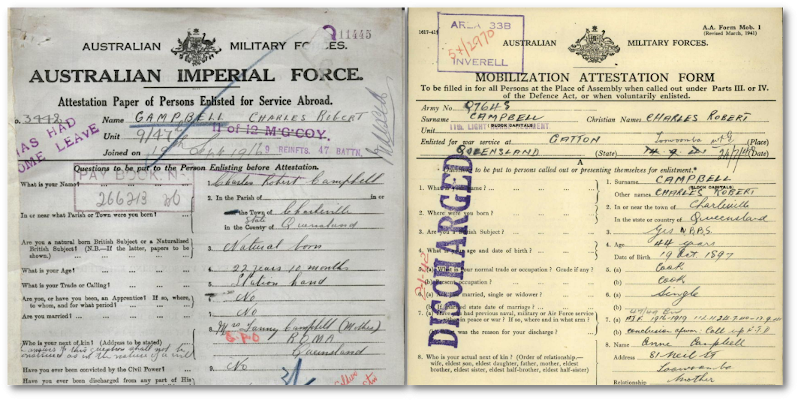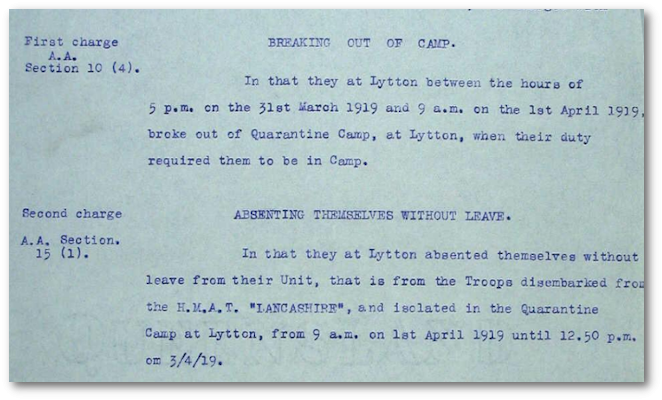Charles Robert Campbell, 47th Infantry Battalion
... When Charlie's ship arrived back in Brisbane the returning troops were quarantined in tents due to the outbreak of influenza ... however Charlie, obviously happy to be home, along with his mate Bill Eddy, broke camp, they took themselves off to celebrate. When the men sobered up they reported back to the compound and were put in the guardhouse.

Service records, Charles Campbell. (National Archives of Australia collection)
Charlie Campbell was born in Charleville to Charles Campbell and Fanny Large in 1893. Charlie was employed as a station hand for T.R. Rouse, manager of Noorindoo Station, near Surat. The Rouse family had close ties with the horse racing industry, which may be why Charlie also stated that he had worked as a jockey.
Charlie enlisted in September 1916 during a push by the Federal Government to secure 5000 men by the end of that month. He initially found himself at Bells's Paddock, Enoggera as a machine gunner, but was later designated an infantry-man and trained at Rifle Range Camp, and assigned to the 9th reinforcements for the 47th Infantry Battalion. They left Sydney bound for England on board the 'Ayrshire' in January 1917 but during the voyage Charlie was admitted to the ships’ hospital twice suffering from a common soldiers complaint of the time, VD.
When Charlie arrived in England in April 1917 he was transported to the 12th Training Battalion at Codford, where he remained until May 1918, then as battalions were reorganized he was transferred to the 49th and marched out to the Overseas Training Brigade, at Hurdcott, in anticipation of being deployed to the front lines in France.
For Charlie, this was not to be, in October he was admitted to hospital suffering from influenza. An epidemic of the deadly virus spread quickly through the troops who lived in close quarters, without vaccines, and who were weakened by the conditions and stresses of war.
By the time Charlie recovered, the war had ended and he sailed for home in February 1919. Before embarking he was medically examined and the officer noted that Charlie had wasted muscles of the left leg, which had been caused by infantile paralysis (polio) contracted as a child. His papers were annotated with the following recommendation "permanently unfit all services".
When Charlie's ship arrived in Brisbane the returning troops were quarantined in tents, for the very same illness that had so affected him in England. However, Charlie obviously happy to be home, along with his mate Bill Eddy, broke camp and took them selves off to celebrate. When the men sobered up they reported back to the compound and were put in the guardhouse.

Charges laid against Privates Charles Robert Campbell and Bill Eddy, 1919. (National Archives of Australia collection)
The two miscreants were court martialled for their absence and sentenced to 60 days imprisonment, which was later commuted to 18 days. Charlie returned to the work he knew on Noorindoo Station, then later at Ticehurst in the same region; in 1937 he was employed as a drover at Garbutt's Camp.
During the Second World War, Charlie Campbell enlisted with the 11th Light Horse Motor Regiment and served in reserve from July 1940 to September 1941, after which he was then called up for full time duty until being released medically unfit, in January 1942.
Charlie Campbell, never married, and died in July 1955, age 61.
* Family advice received is that Charles Robert Campbell was of Aboriginal descent.
Read more ...
- Service record: CAMPBELL, Charles Robert
- Embarkation roll: 9th Reinf. 47th Infantry Battalion
- Court Martial William Eddy & Charles Campbell, 10 April 1919
- SURAT. Western Star and Roma Advertiser, 9 July 1919 p.2
The information in this blog post has been researched by State Library staff and volunteers, it is based on available information at this time. If you have more information that you would like to share or further research uncovers new findings, this post will be updated.
Comments
Your email address will not be published.
We welcome relevant, respectful comments.